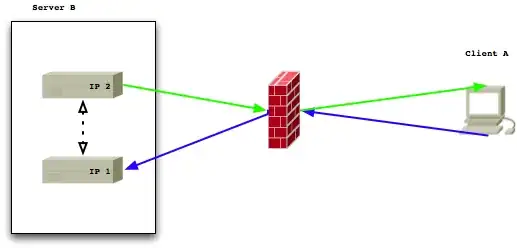I'm facing a challenge with my PF firewall on an OpenBSD machine.
From a client (A) I'm connecting to a server (B) using a target ip (SRV-IP-1). The server is replying to my request, but sourcing the reply from a different IP (SRV-IP-2).
The firewall is dropping the reply, since it's unable to understand that the reply is part of a conversation originated from the inside network (it thinks that the reply is a connection started from outside).
Is there a way to instruct the firewall to consider a reply valid if coming from, say, a "pool" of addresses instead of the address used as the conversation target (SRV-IP-1)? For example, it would be nice to map a specified address with other addresses, to "chain" the state.
Thank you.
